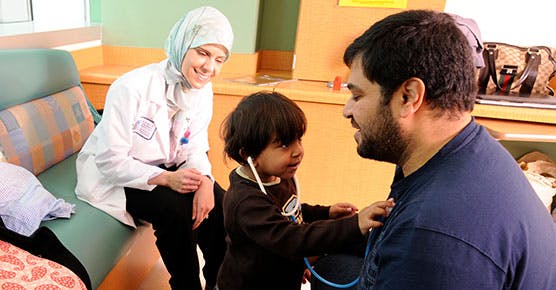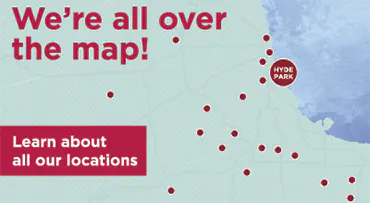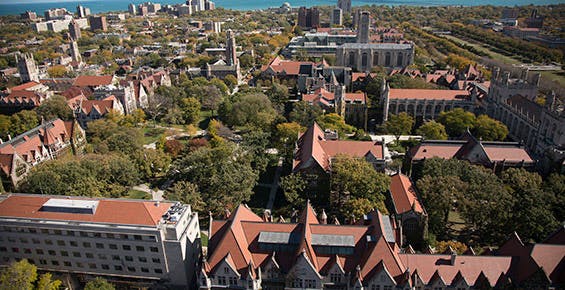Preparing for Your Child's Procedure or Surgery
We want you and your child to have a safe, comfortable experience at the University of Chicago Medicine Comer Children's Hospital. If you have any concerns about your child's surgery or procedure, please speak with your child's surgeon, nurse or other member of his or her health care team.
Preparing for Your Child's Procedure or Surgery
Many insurance companies require referral or pre-certification information. Please contact your insurance company and primary care physician as soon as possible. When you speak to your insurance company, you will need the following information:
- Diagnosis and ICD9 code
- Surgical procedure
- Type of admission
- Estimated length of stay
- Specialist's name and phone number
If you have insurance-related questions, please call Pediatric Admissions Services at 773-702-6234 between 8:00 a.m. to 4:30 p.m., Monday through Friday, before you arrive. If further information is needed, please call your surgeon's office.
If your address or phone number changes, please contact your surgeon's office with your new contact information. Your child's surgeon must have current information in order to be able to contact you.
Before your child's surgery, his or her surgeon will give you instructions concerning food and liquids. It is very important that you and your child follow these directions, so the surgery or procedure may proceed as planned.
On these instructions, you may see signs or notations stating "NPO." NPO stands for a Latin phrase, which means "nothing to eat or drink." If you fail to follow the NPO orders, your child's surgery will be cancelled.
Before the procedure, your child should visit his or her surgeon or physician in the clinic for evaluation. At that time, you should bring a list or the bottles of all prescriptions or over-the-counter medications that your child is taking, as well as any vitamins or other supplements. You should discuss with the physician which medications should be stopped before surgery. These may include:
- Medications that contain aspirin
- Allergy medications
- Medications for chronic conditions
- Herbs and vitamins
On the day of your child's surgery, bring a written list of your child's current medications, how much of each medication your child takes and how often he or she takes it. It is important to have this information on hand, even though your physician has reviewed your child's medications previously.
To reduce the chance of infection, be sure your child showers or bathes using an antimicrobial soap no more than 12 hours prior to his or her surgery. An appropriate product is available from the hospital. Please discuss this with your surgeon in the clinic.
If your child develops a cold, fever or other illness prior to his or her surgery or procedure, contact the surgeon's office. Your child's surgery may need to be rescheduled.
To assist children experiencing medical emergencies, we may need to delay or even cancel your child's surgery. In this event, your patience will be appreciated.
You should be able to provide the following information:
- Your child's Social Security card or other identification card
- Insurance card (examples: Blue Cross Blue Shield card, Medicaid card)
- Referral authorization form (if required by your insurance)
- Your child's primary care physician's name, address, phone number and fax number
Surgery and procedures take place in different areas. Most will take place in the following locations:
Third Floor of Comer Children's
For all surgeries and procedures on the third floor of the hospital (with the exception of catheterization procedures), please enter Comer Children's through the main entrance and check in at the Security Desk. Before surgery, you may wait with your child in the pediatric pre-operative area located on the third floor.
SPA in the Comer Center for Children & Specialty Care
The SPA is located on the second floor of Comer Children's, in the the Comer Center for Children and Specialty Care. The clinics are accessible through dedicated elevators off the Comer Children's main lobby, and are specifically designed for children. Before surgery, you may wait with your child in the SPA area.
Cardiac Catheterization Procedure on the Third Floor of Comer Children's
For all catheterization procedures, please enter Comer Children's through the main entrance and check in at the Security Desk. Before the cardiac catheterization, you may wait with your child in the pediatric pre-operative area located on the third floor.
Below you'll find links to information that may help you and your child prepare for a surgery or procedure.
While your child is having surgery, family members may wait in lounge areas. If your child is having surgery at Comer Children's, you may wait in the surgery family waiting area on the third floor.
If your family leaves the waiting area, it is best that you let the attendant know when you will return, so that the surgeon can keep you informed of your child's status.
Food and drink are not allowed in the waiting areas. Your family can ask the attendant for the nearest locations of snack bars and cafeterias.
It is our goal to ensure your child is comfortable after his or her surgery or procedure. While it is not always possible to make everyone absolutely pain free, physicians, nurses and staff at Comer Children's are committed to alleviating your child's pain to the greatest extent possible. Parents play an important role in helping decrease pain, fear and stress.
Age-appropriate pain scales are used in Comer Children's. You are invited to discuss your concerns about your child's experience with his or her physician, nurse, child life specialist or another care team member.
Your surgeon will provide you with instructions for your child to follow at home. It is important that your child follows them carefully to assure a smooth recovery.
Notify your surgeon's office immediately if your child experiences:
- Any bleeding or drainage from the operative site
- Has unusual redness or pain
- Starts running a temperature over 101 degrees Fahrenheit
- Other "danger signals" you and your surgeon may have discussed
Your surgeon or nurse will schedule a return visit to the outpatient clinic for your child, so they can check your child's progress after surgery and confirm that he or she is healing well.
Health Care Team
Throughout the University of Chicago Medicine Comer Children's Hospital, you will find staff members who are specially trained to work with children and their families. Listed below are some of the many people who may be involved in your child's care.
- Attending physicians are fully trained childhood disease specialists who are responsible for your child's care during a hospitalization. They will direct your child's care and supervise the residents, interns, and medical students who are also caring for your child.
- Consulting physicians are doctors with an area of expertise who may be asked by your child's attending physician to help diagnose and treat your child.
- Residents are physicians in their second or third year of training after medical school graduation. There will be a resident assigned to care for your child during your child's hospitalization.
- Interns are physicians in the first year of training after graduating from medical school. An intern will be assigned to your child's care with a senior resident.
- Fellows are physicians who have finished their residency and are now training in a special field of medicine.
- Case managers are registered nurses who coordinate the many services your child may need for his or her hospitalization and discharge.
- Chaplains help children and families find meaning and support in their circumstances. A chaplain is available for pastoral visitation and/or sacramental ministry, as well as to help you contact a representative from your faith group. Chaplains are available 24 hours a day.
- Child life specialists use their knowledge of child development, play, stress and coping, and family systems as the basis to help reduce the stress and anxiety that many children experience in hospital and health care settings. They focus on the needs of the entire family by also providing support to parents and siblings.
- Dietitians are licensed, registered food and nutrition experts who work with families and children with complex nutrition needs. Registered dietetic technicians also work with families and children with less complex nutrition needs.
- Family advocates work to improve the communication between the family and the hospital staff, as well as make sure your child's hospital stay goes well.
- Medical students are in their third or fourth year of training to become physicians. They work closely with the medical team of physicians.
- Nurses are responsible for making assessments of your child's condition and supervising your child's care while in the hospital unit.
- Nurse practitioners are registered nurses with a master's degree and a specialization.
- Occupational therapists provide therapy to children facing any challenges that affect socialization, their daily activities at home, and school performance. Occupational therapy may be performed either in your child's room or in a treatment room.
- Patient care managers (PCMs) are registered nurses who supervise a nursing team.
- Patient service assistants (PSAs) transport patients and assist nurses in meeting patients' personal needs.
- Patient service coordinators (PSCs), often called the "unit secretaries," answer phone calls to the hospital unit and respond when you or your child press the "call" button in the room.
- Phlebotomists draw blood from your child for various medical tests.
- Physical therapists help patients regain muscle strength through specially designed exercises. Physical therapy may be performed either in your child's room or in a treatment room.
- Respiratory therapists provide special care to children who have difficulty breathing.
- Social workers are licensed counselors who may also help children and families by connecting them with needed community resources.
- Speech therapists work with children who have difficulty talking or making certain sounds. Speech therapists also work with children who have difficulty swallowing.
- Stockers make sure your child's room has all the necessary nurse's supplies.
- Teachers are available to children who miss 10 or more days of school during the entire school year. Besides helping children keep up with their school work, a teacher will give them a needed routine that helps children feel they are keeping up with their peers. All teachers are licensed by the state of Illinois.
- Volunteers work throughout the hospital to engage children in play activities at the bedside or in the playroom. Their goal is to help make the hospital stay a little easier for the entire family. Note: Volunteers do not take the place of trained medical staff at UChicago Medicine.
Patient & Visitor Resources
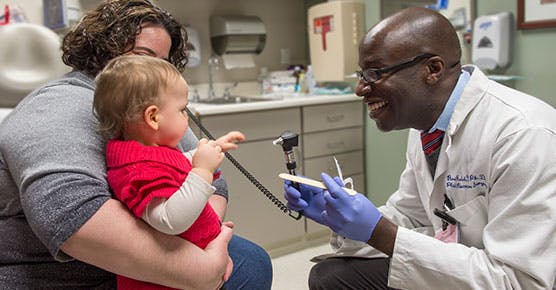
Patient Information
Learn more about our comprehensive patient resources
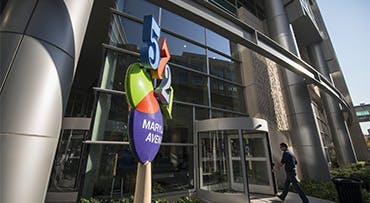
Directions & Maps
Find directions and maps to Comer Children's
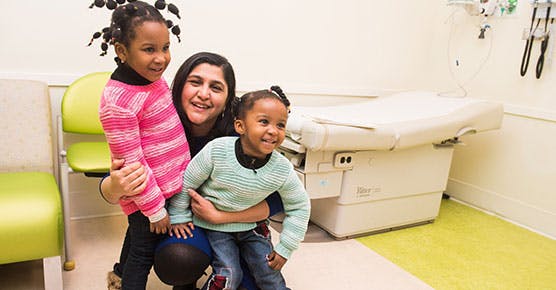
Visitor Information
Read about the visitor resources we offer

